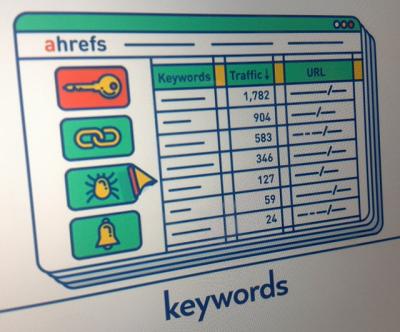Do you have a website but you’re struggling to get any traffic to it? Are you paying a small fortune every month to get your traffic? Would you like to get that “free” traffic from the organic search results? Here are 5 Tips to help you get started.
Tip #1: Be Patient and Persistent
Ranking up in the search engines won’t happen overnight. It takes time and continued effort to get there. Even with the best SEOs and the biggest budget, it can still take months to move up the rankings of even a moderately competitive market.
If you’re in a very highly competitive market, with big, established top results from big, established companies, you may need over a year to gain ground on them, so be patient and persistent if you want your SEO plans to bear results.
Tip #2: Make Sure You’re Listed

If you’re not listed, that means search engines don’t know your site exists and you won’t appear anywhere on their rankings, no matter what you do, at least not until you do get listed. If there is some problem that’s caused your site to be de-listed, you’ll need to identify it and resolve it to the search engine’s satisfaction to get back on their list.
A good starting point for Google is to add your site to the Google Search Console. Follow these instructions to find out if your site is listed. If not they have useful tips to help you get your site listed. Other search engines like Bing and Yahoo will each have their own set of instructions to make sure you’re listed and if not, how to get on their listings.
Once you’re on the listings of the main search engines, you can now start working on how high you rank on those lists.
Tip #3: Find Your Keywords

Image by Lucas Velásquez – https://www.flickr.com/photos/33721910@N00/28352963053
The keywords are what people looking for something type into the search bar. You need to anticipate what basic searches people will be likely to use when searching for the products or services you have to offer.
If you have already taken care of your branding and know who your market is and how they’ll find you, you’re in a much better position to successfully find the right keywords to target for ranking up.
What Are Good Keywords?
That is a topic unto itself, but in a nutshell, it’s phrases that have enough people using them to be worth your expenditure and time, but not so competitive you would have no chance of beating the top 10 results. They also need to be relevant and if they’re phrases that indicate someone is ready to buy, even better still.
If you’re struggling with this, there are good tools to help you find good keywords. You could also hire an expert to find your keywords for you. Finding the right keywords for our clients is one of the things we do so if you need help with this then feel free to contact us for further help in finding your best keywords.
Tip #4: Content Strategy
If you already have a communications or marketing strategy, you can incorporate your company’s blog content strategy into that quite seamlessly. Pick topics that allow you to naturally insert your keywords into the content and still convey the key messages you’re strategy calls for. If you’ve done your branding and keyword research right, they should both be compatible and even very similar to each other.
How many times should my company post?
 The more often the better, as more posts means more contents and showing you’re more relevant then everyone else faster. However, quality is far more critical then quantity. If you pump out piles of low quality articles just to pump out those keywords, you may yet move up the rankings, but you won’t get any real results from that as people won’t stay.
The more often the better, as more posts means more contents and showing you’re more relevant then everyone else faster. However, quality is far more critical then quantity. If you pump out piles of low quality articles just to pump out those keywords, you may yet move up the rankings, but you won’t get any real results from that as people won’t stay.
The way Google works, if people don’t stay on your site, they’ll start moving you back down the rankings as their business is to provide people with relevant search results. If your site is not getting people engaged, they’ll assume your content is not relevant and will start dropping you back down. Also, the traffic you get won’t help you any as they won’t buy from you. At the end of the day, the primary goal of SEO, like any marketing technique, is to produce leads and, ultimately, sales. If you’re strategy is not leading to any new sales, it’s not doing you any good.
If you publish high quality articles that are relevant to the searches people are doing, and to your offers, people will respond. They’ll buy something, sign up to an email or phone list, or contact you. One way or another, they’ll take an action.
If you’re company is not publishing blogs on your primary website, you won’t get these benefits, you won’t move up the search results, and you won’t connect with new customers.
If you are publishing on a separate blog, you’re essentially forcing yourself to move 2 sites up the rankings instead of just one. The amount of work needed increases exponentially so all you’re doing is splitting your efforts and hindering your results. With tools like WordPress, Drupal, Weeply, Wix and others, there’s no reason to do this anyways. Move your contents onto your company’s main website. It will be well worth the effort.
If you are publishing blog articles to your company’s main website, but aren’t seeing any results, either in improved conversions, or improved rankings, you may be missing the mark somewhere. Either you’re not publishing frequently enough, your contents are not relevant enough or not interesting enough. You may be targeting keywords too competitive for your resources or too small to generate any significant traffic. You may have another problem with your website or your strategy. There are many reasons why a content based SEO campaign can fail.
If you’re doing SEO or blog contents and not seeing results, consult with an experienced SEO professional. We can examine your current approach and results and start to debug where it’s going wrong. Feel free to contact us for a consultation if you need to debug your campaign if you’re not getting results from it.
Just remember that it does take time to see results, so if you’ve just started, it may just be you need to keep at it and give it more time.
Tip #5: Links to Your Website (Backlinks)
![]() These will help you move your site up the search results, but there is a catch, these links have to be of good quality.
These will help you move your site up the search results, but there is a catch, these links have to be of good quality.
If you work at it, and get the agreement of other websites to link to your site, you will start to pick up quality links. If you try to take shortcuts, you’ll find your site with spammy, cheap links from spammy, cheap websites, and no search engine wants to send people to websites that take such shortcuts, so they’ll have ways of detecting if a site is taking shortcuts and penalize offending sites. In really bad cases, they may even remove the site from their listings and blacklist it!
Getting quality backlinks then, takes time and effort, just like everything else does. Some ways you can get good quality backlinks include:
- Finding blogs about relevant topics and asking them to carry an article you wrote in exchange for them including a link back to your website. Many blogs and news sites will agree to this. In fact, many are starved for content and will jump at the chance to get your free contents. The more reputable the better, but the more reputable ones tend to also be less starved for contents so you may have to put in some effort or be willing to pay to get your contents on such sites.
- Find companies in related industries who would be willing to exchange links to each other’s websites, basically mutual backlinks if you will. The best choices here would be companies with complementary products, such as if someone buys your products, they’ll benefit from or need your competitor’s, and vice-versa.
- Post your articles to your social media sites. These are also backlinks and will contribute somewhat to your search rankings, and can also contribute direct traffic from the social media platforms, as well as contribute to growing your presence on those platforms too. It’s a win-win!
- Add an easy way for your readers to share your articles to social media, email them to friends and in general share your articles. That’s also more backlinks and more direct traffic opportunities.
These 5 tips are just the basics of what you need to do to move your website up the search rankings and have it power sales for you. For it to be effective, a great deal of work and expertise needs to go into these and other efforts to power your website up the rankings and get those increased sales. That’s where the expertise of an SEO professional like me comes in, I can help you through the pitfalls, find the winning strategies, and debug the failing strategies, all to get you to that ultimate goal of your Search Engine Optimization, increasing your sales by more then you invested into your SEO strategy.
If you have any questions, comments or issues you’ve run into with your website’s SEO or conversions, I’d love to hear about them either in the comments below or by contacting me.




